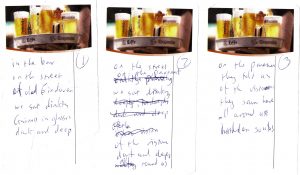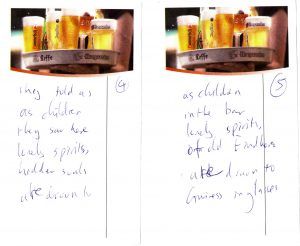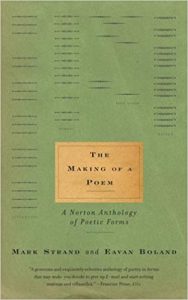I forgot.
How could I forget?
Memory is a fickle thing, not metal storage shelves, or neat filing drawers, but like the tide throwing up flotsam of your past and then withdrawing, just traces in the sand.
We had been sorting boxes long in storage, and I had made my way through plastic crates full of old screws, hinges, locks without keys, and half window-latches. Some I had collected myself over the years, some I’d inherited from Fiona’s grandpa, and some were my dad’s, accreted through a life as builder, carpenter and maintainer of the old Victorian terrace where I was born. All were coated with that dusty brown patina of age, not the rich iridescent rust of wet, but the dull discolouration that rubs off on your hands and leaves small scatterings on the bottom of tins.
There had been one tin, full of such scatterings, and it had gone into the metal recycling box, amongst others.
I had discarded the brown Tupperware box in which I’d kept my own collection of reusable screws as a boy, a few ‘liberated’ from secondary school desks when it seemed fun to see how many screws you could remove from the lids whilst still leaving them, at least apparently, intact.
What would dad have thought? Maybe some would have been the same desks he had repaired when I had still been in infant school. A few times a year he would be in our school, repairing desks and chairs – in those days all wood. It is likely he also visited the high school where I eventually ended up, wondering how the lids got loose as a previous generation of school children had a short-lived craze of minor vandalism. How many of the scored and inked images and slogans on the desks where I later sat had been there when he had touched them.
The touch of an object, the feel of it under your fingers, bringing back the past. Only it didn’t, the tin was cast thoughtlessly amongst the decaying ironmongery, detritus of a save-it-just-in-case mentality inherited from those who had seen one or two world wars.
Only after, I remembered.
The tin was long and thin, perhaps ten inches long and two and a half or three wide; square in cross-section; I always assumed it was designed for cream crackers. The lid was large-chequered white and red, with an embossed pattern highlighted in long faded gold, but I only half remember, the way you do with things so intimate, so normal, they are merely the background.
Is it always the way that the things that are closest, most dear, are most easily forgotten?
I took no photograph.
It is gone.
I always say, as a tease, that the smell of meths is the smell of childhood; it reminds me of my dad. And it is true.
He was no drinker, certainly not when I knew him, who knows in his youth. In the sideboard cupboard there was a bottle of cherry brandy that I never recall being opened. Did mum and dad sometimes have a small glass after Jacqui and I had gone to bed? I only ever recall very occasional glasses of sherry at Christmas, and maybe that was only mum.
The smell of meths was surgical spirit; twice a day, regular as the clock that was also wound daily, he would inject insulin. Small bottles with round rubber tops, the needle reused, none of today’s disposable needles, or discreet pens, but his trousers wound down and the needle pressed into his thigh, the skin and needle cleaned with cotton wool soaked in the clear spirit. I wonder how many times he reused the needle; I guess until it was too blunt to break the skin.
When a little older, I recall going together to Cardiff Infirmary, I assume for a check-up – the dull post-war institutional painted corridors, and that smell of hospital … soap and disinfectant, and in those days I’m sure also a touch of meths. I do not know whether it was just once or many times, and why I recall it being just the two of us – maybe it was when Jacqui had started school and I had not, or perhaps Jacqui had gone with mum somewhere, or maybe just that soliloquy of childhood that sees everything through one’s own eyes, forgetting that others were there too.
But in my earliest memories, not the hospital, just the smell, the needle and, in every drawer, handbag, and car shelf, sugar lumps and gold wrapped bundles of Bournville chocolate.
When we went out for the day, or drove away on holiday, mid-morning and mid-afternoon we would always stop for a cup of tea and a bite to eat. Then as now, injected insulin was only half the cure; he had to be careful to eat regularly.
In the summer, on a fine day, we would park the car. Dad would take out a Camping Gaz stove from its blue metal box and the kettle would boil while Jacqui and I played in the sun or sat in the back of the car with a sticky-back-plastic-covered plank as a table.
At other times there were cafés, some with Formica topped tables and counters, others oak panelled – always in those days waitress service. Toasted tea-cakes are still a comfort food.
If we stopped for lunch then we would often have soup with crusty rolls. I’m sure they were in the local bakers too, but I always associate those rolls with days out and restaurants. Jacqui and I would pull out the moist white bread from the middle with our fingers, making mouse houses from the hollow crusts, and then, of course, finish with the crusty parts themselves, still the best portion of any loaf.
Neither dad nor mum took sugar in their tea, but on the table there would always be a bowl full of sugar: sometimes naked white lumps piled high, tempting for a small child, and maybe Jacqui and I would be allowed one each to suck. Sometimes they came in little paper packets, two bundled together – standard dose for a cup of tea – and, if they did, dad would take a few and add them to his collection, for emergencies, if he felt low on sugar, or if for some reason we were late eating.
Once, I recall dad getting angry and shouting at home, a thing rare enough that I remember it. After a while he and mum realised that he had not eaten, and his temper dissolved as his sugar level rose.
The diabetes was managed, part of the background, one of those things so intimate, so common they are not thought about, but never entirely forgotten.
Once dad broke his toe whilst moving a table in the church schoolroom. His foot was in plaster for weeks, but the worry was always that gangrene would set in.
Only later, after dad had gone, I discovered that one of his brothers had died in the 1920s, still in the early days of insulin treatment when they were trying to understand the correct dosages. The insulin prolonged his brother’s life, but also, in the end, killed him.
I always assume dad’s diabetes was late-onset, otherwise he would never have lived until Jacqui and I were born. Late enough that insulin was better understood. Perhaps it had come at a time of stress, in the 1940s when he divorced his first wife, or when his second wife died.
Nowadays, whenever I have a blood test myself, I always ask about the sugar levels.
And the tin?
At home, cups of tea were as much a ritual, dad’s cup bigger than mum’s, but always a cup and saucer; mugs for tea were still many years off. Jacqui and I learnt to drink tea from dad’s saucer. He would pour a little tea on the saucer, blow it and let us sip the cool liquid. It was not just for us, but a trick he sometimes used himself to cool his tea rapidly – a habit from his work as a carpenter to drink quickly in short tea breaks.
With the tea there were no custard creams or bourbons, no chocolate biscuits, nothing iced topped nor anything too sweet, but instead rich tea fingers, thin oval-shaped biscuits with crimped edges. Dad would have two, resting on his saucer and then dunked in the tea until they were soft and warm.
They came in two kinds, one in blue and white packets and slightly lighter in colour, similar in taste to the thicker, round rich-tea biscuits that are more common today; the others in clear packets, with a darker colour and a subtly richer, more savoury, almost nutty taste.
I don’t remember now whether we regularly ate them too as small children or whether they were a grown-up thing. I do recall Jacobs Club biscuits as a treat, always the orange ones. Later as an older child, when I had my own tea, I was always torn between the soft melting texture of dunked finger biscuits, or nibbling them, first around the edge, removing just a few millimetres of the neat crimping, before starting at one end – then, with rodent-like reciprocating teeth, reducing them to sawdust-like powder in my mouth.
The rich tea fingers lived in a tin, and the tin on the sideboard, always.


